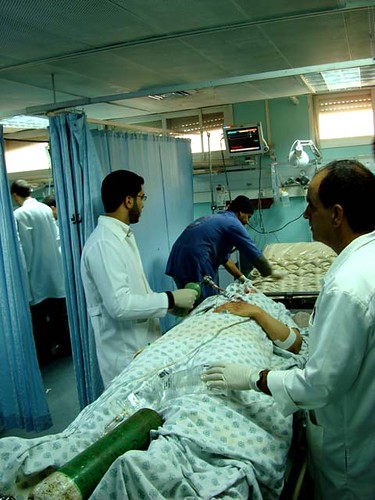The Stakes of Rafah
Rafah #Rafah

Over the past several months, the Israeli military has gradually forced about 1.5 million Palestinians in Gaza to the city of Rafah, on Gaza’s southern border with Egypt. Now, the Palestinians displaced to what Israel has called a safe zone are under severe risk of Israeli bombardment and a military ground campaign. Many of the refugees have been displaced several times since Israel began its military operation in Gaza in October.
During Sunday night’s Super Bowl, Israel launched airstrikes on Rafah that killed at least 67 people, among the some 28,000 Palestinians killed since October. This comes after Israel conducted several other deadly military strikes in Rafah in recent days. Israel has claimed that the operations are necessary to eliminate Hamas, which it believes to be active in the border city. It’s difficult, however, to square this extreme and seemingly indiscriminate violence with what Israeli officials have said is a shift toward a new, lower-intensity phase of the war.
The Rafah crossing is where most humanitarian aid enters the occupied Palestinian territory. Israel pushed Palestinians from their homes in northern and central Gaza to the south, and they are enduring a humanitarian catastrophe.
More from Jonathan Guyer
Earlier on Super Bowl Sunday, President Joe Biden told Israeli Prime Minister Benjamin Netanyahu that “a military operation in Rafah should not proceed without a credible and executable plan for ensuring the safety of and support for the more than one million people sheltering there,” according to a White House summary of their February 11 call. But the backroom rebukes from Israel’s biggest supporter have failed to constrain attacks on Palestinians in Gaza, which Biden conceded last week have been “over the top.” And the lack of U.S. consequences for what Biden has called “indiscriminate bombing” of Gaza suggests that Netanyahu’s military campaign will continue unabated, even against over a million civilian refugees with nowhere else to reasonably retreat.
The stakes of further Israeli strikes and a broader military incursion on Rafah are significant. More strikes like these would reveal the limits of Biden’s influence over Netanyahu, the possibility of a bigger regional conflict, and a tremendous loss of life for Palestinians who are already facing a humanitarian emergency.
An Israeli assault on Rafah would be cataclysmic. Egypt cautioned that it would void its Camp David peace accord with Israel if internally displaced Palestinians were forced across its border. Saudi Arabia warned of “very serious repercussions of storming and targeting the city of Rafah.” United Nations Secretary-General António Guterres said, “Such an action would exponentially increase what is already a humanitarian nightmare with untold regional consequences.”
Rafah, despite being Gaza’s main conduit for aid, faces significant shortages of food, water, and medicine, like the rest of the territory. Before the war, Rafah’s population was about 270,000. The more than one million Palestinians pushed there are straining to obtain the basic necessities of life. Most Palestinians there are living in tents or without shelter, as Israel has destroyed most buildings in the Gaza Strip. And bureaucratic hurdles have slowed the entry of trucks carrying essential aid, which are waiting on the Egyptian side of the crossing for inspection.
White House National Security Council spokesperson John Kirby had dismissed questions about an imminent incursion into Rafah as recently as last week. “I could tell you that—absent any full consideration of protecting civilians at that scale in Gaza—military operations right now would be a disaster for those people, and it’s not something that we would support,” he told reporters on February 8.
There is speculation that the Israeli military does not have the capacity for an immediate full-scale ground invasion of Rafah, but the ongoing bombardment of the safe zone remains troubling and has already led to the loss of life.
Such a military operation may further strengthen the case that Israel is enacting war crimes, or even genocide, as South Africa argued before the International Court of Justice. Karim A.A. Khan, a prosecutor for the International Criminal Court, observed that he had “not seen any discernible change in conduct by Israel” throughout the conflict, and cautioned that “those who do not comply with the law should not complain later when my Office takes action pursuant to its mandate.”
Israel may be considering further displacing the million-plus Palestinians in Rafah to the nearby coastal town of Al-Mawasi, according to a recent report in Haaretz by Amira Hass. What’s not clear is how these Palestinians would be forced there and, assuming the bulk of humanitarian assistance is centered in Rafah, how they would be relocated.
Many analysts in Washington have focused their Middle East policy recommendations on the so-called “day after” in Gaza, but with such harrowing conditions very much ongoing, this may be the longest “day of” in history, and it isn’t over yet.
February 13, 2024
5:10 AM